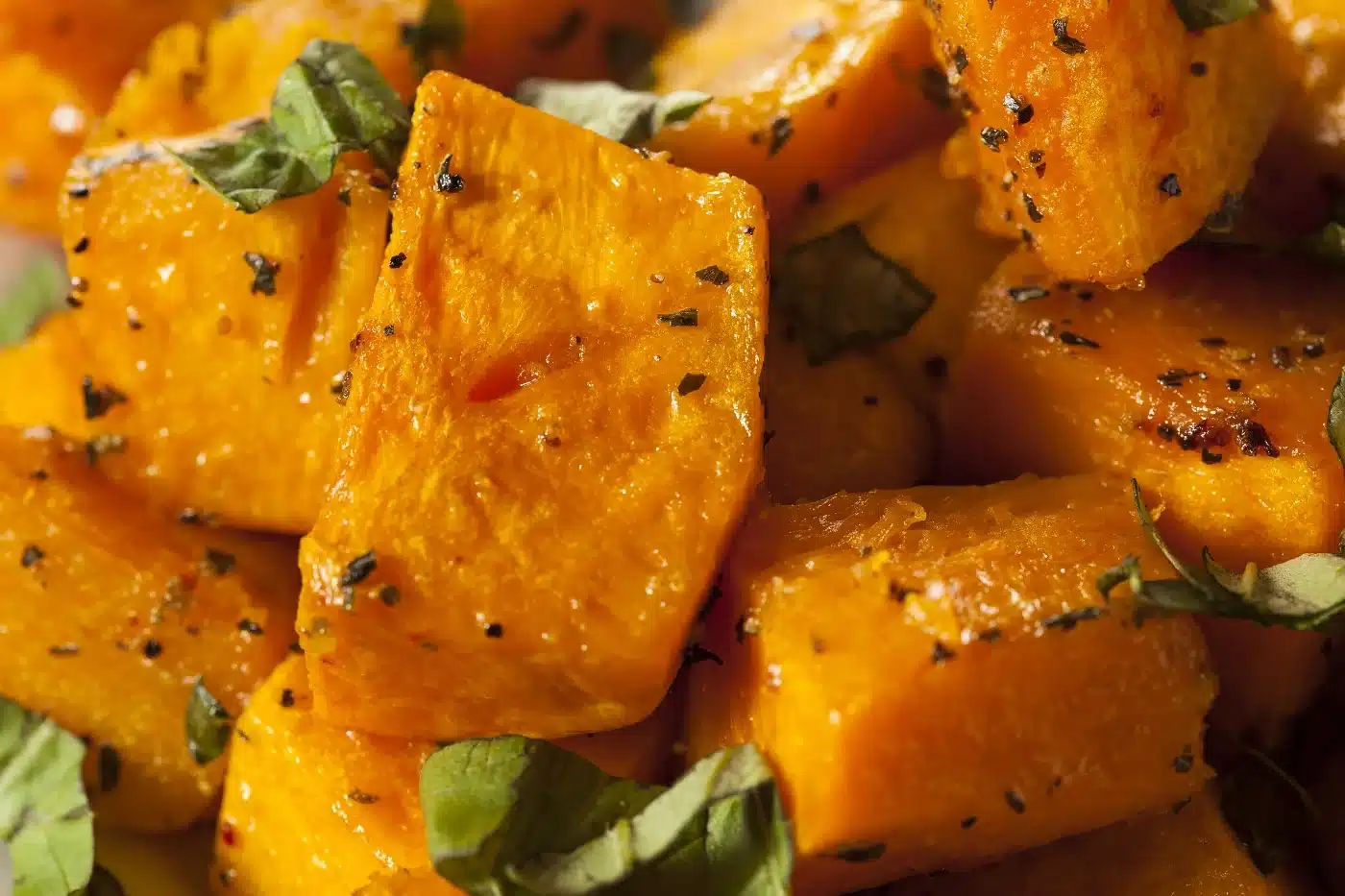Pumpkin is a delicious and versatile vegetable that’s not only tasty but also packed with nutrients that can benefit your health in numerous ways.
Key Takeaways
- Pumpkin is nutrient-dense, low in calories, and high in fibre
- It contains essential vitamins and minerals like vitamin A, C, and E, as well as potassium, magnesium, and copper
- Pumpkin offers numerous health benefits, including boosting immunity, supporting eye health, promoting skin health, enhancing heart health, and improving metabolic health
In this blog post, I’ll explore the nutritional profile of pumpkin and discuss how it can support various aspects of your well-being.
Pumpkin Macronutrients
There are several types of pumpkins, each with its own unique characteristics and nutritional profile. The table below shows the macronutrient breakdown for a regular serving (1 cup, cooked) and 100 grams of pumpkin:
| Nutrient | Regular Serving (1 cup, 245g) | 100 grams |
|---|---|---|
| Calories | 49 | 20 |
| Protein | 2 g | 0.8 g |
| Carbohydrates | 12 g | 4.9 g |
| Fibre | 3 g | 1.2 g |
| Fat | 0.2 g | 0.1 g |
Please note that the nutritional values may vary slightly depending on the specific variety of pumpkin. The values provided are based on an average of various pumpkin types.
Nutritional Profile
Pumpkin is incredibly nutritious, packed with vitamins, minerals, and fibre. Here’s a closer look at the nutritional content of both pumpkin flesh and seeds.
Pumpkin Flesh
One cup (245 grams) of cooked pumpkin provides:
- Vitamin A: 245% of the Daily Value (DV)
- Vitamin C: 19% of the DV
- Vitamin E: 10% of the DV
- Potassium: 16% of the DV
- Copper: 11% of the DV
- Manganese: 11% of the DV
Pumpkin is also low in calories, with only 49 calories per cup, and high in fibre, providing 3 grams per cup.
Pumpkin Seeds
Pumpkin seeds, also known as pepitas, are nutrient-dense and offer a range of health benefits. One 28-gram serving of pumpkin seeds contains:
- Protein: 7 grams
- Magnesium: 37% of the DV
- Zinc: 14% of the DV
- Manganese: 42% of the DV
- Iron: 11% of the DV
- Phosphorus: 33% of the DV
Pumpkin seeds are also a good source of healthy fats, with 13 grams of fat per serving, mostly from monounsaturated and polyunsaturated fatty acids.
Health Benefits
The nutrients found in pumpkin offer a wide range of health benefits, from boosting your immune system to promoting heart health. Here are some of the ways pumpkin can support your well-being:
- The high vitamin A content in pumpkin helps support your immune system by enhancing the function of immune cells.
- The beta-carotene in pumpkin, which your body converts to vitamin A, is essential for maintaining healthy vision.
- The antioxidants in pumpkin, including vitamins A, C, and E, help protect your skin from damage caused by free radicals and UV radiation.
- The potassium in pumpkin helps regulate blood pressure, which is important for maintaining a healthy heart.
- The high fibre content in pumpkin can help regulate blood sugar levels, which is especially beneficial for people with diabetes.
Ways to Enjoy Pumpkin
Pumpkin is a versatile ingredient that can be enjoyed in both sweet and savoury dishes. Here are some ideas to help you incorporate more pumpkin into your diet:
- Roast pumpkin chunks with olive oil, salt, and pepper for a simple and delicious side dish
- Add pureed pumpkin to soups, stews, and curries for a creamy texture and nutrient boost
- Use pumpkin puree as a base for healthy smoothies, paired with ingredients like banana, yoghurt, and cinnamon
- Incorporate pumpkin into baked goods like muffins, bread, and pancakes for added moisture and nutrients
- Roast pumpkin seeds with your favourite seasonings for a crunchy, nutrient-dense snack
Pumpkin-Flavoured Processed Foods
While pumpkin itself is incredibly nutritious, it’s important to be mindful of processed foods that contain pumpkin flavouring. Many of these products, such as pumpkin spice lattes and pumpkin-flavoured baked goods, are high in added sugars and unhealthy fats.
To reap the health benefits of pumpkin, focus on incorporating the whole vegetable into your diet, rather than relying on processed foods that may contain artificial flavours and added sugars.
FAQ
- Is pumpkin a fruit or vegetable? While pumpkin is technically a fruit because it contains seeds, it is often considered a vegetable from a culinary perspective.
- Can you eat pumpkin seeds and flowers? Yes, both pumpkin seeds and flowers are edible. Pumpkin seeds can be roasted for a nutritious snack, while pumpkin flowers can be stuffed, battered, and fried.
- Is canned pumpkin as nutritious as fresh pumpkin? Canned pumpkin is a convenient alternative to fresh pumpkin and retains most of its nutrients. Just be sure to choose pure pumpkin puree rather than pumpkin pie filling, which contains added sugars and spices.
Pumpkin Packs a Nutritional Punch
Pumpkin is a nutrient-dense vegetable that offers a wide range of health benefits, from boosting immunity to promoting heart health. By incorporating pumpkin into your diet through a variety of delicious recipes, you can enjoy its many nutritional advantages while satisfying your taste buds.
Focus on whole pumpkin and minimally processed pumpkin products to maximise the health benefits of this versatile vegetable. With a little creativity in the kitchen, you can easily make pumpkin a regular part of your healthy eating plan.
